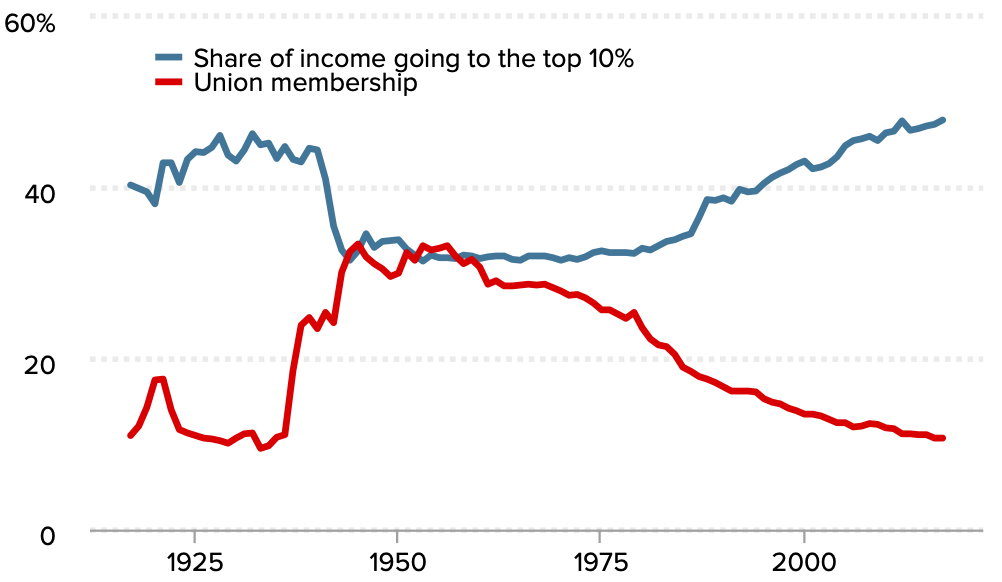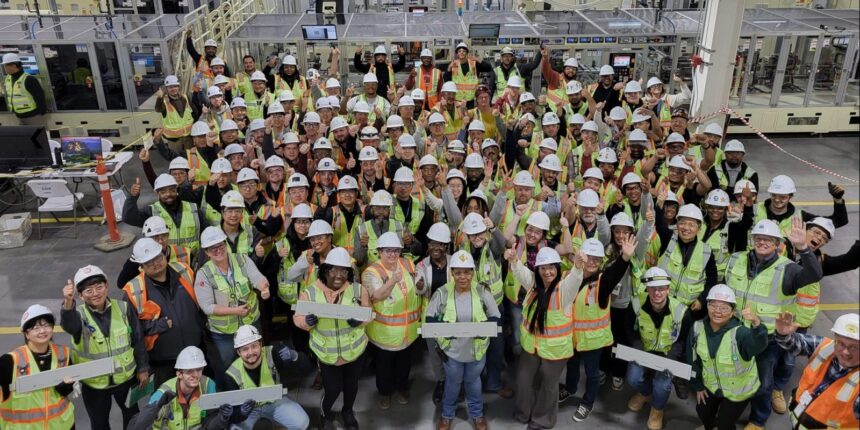The General Motors Ultium battery plant in Spring Hill, Tennessee, has voted overwhelmingly in favor of unionizing. While that’s the second General Motors (GM) battery plant to unionize, this development stands out due to its location in Tennessee, where labor unions are significantly less prevalent.
With union membership rates experiencing a resurgence in the United States, pro-union sentiment has reached unprecedented levels across the country.
The United Auto Workers (UAW) has been instrumental in driving the trend of unionization across the US automotive industry, with a particular focus on electric vehicles and battery manufacturing.
It was its first major victory when General Motors’ initial Ultium battery facility’s workforce voted resoundingly in favor of unionizing with the United Auto Workers (UAW) in 2022. Throughout the 2023 UAW strike negotiations, Ultium employees gained the right to be represented under a union collective bargaining agreement, securing higher pay and enhanced job protections for battery workers.
The United Auto Workers’ (UAW) successful strike resulted in pay raises not only for union members but also for non-union employees across the organization, highlighting the broader impact of union victories on compensation structures.
The string of victories has apparently caught the attention of the General Motors (GM) Ultium battery plant in Spring Hill, Tennessee, as over 90% of its 1,000-strong workforce signed cards indicating their desire to join the United Auto Workers (UAW), with the union’s current proposal being the catalyst for this move. The United Auto Workers (UAW) has concluded that General Motors (GM) and its partner, LG Chem (a key stakeholder in their joint venture, Ultium Cells), did not interfere with the union’s voting process and have committed to recognizing the UAW’s representation of workers.
The Spring Hill location marks the second Ultium plant to start production, having done so earlier this year. Following closely on the heels of Lordstown, which successfully transitioned to manufacturing and unionization by 2022. The recent announcement suggests that all of General Motors’ currently operating facilities have ratified a decision to form a labor union.
Another facility in Lansing, Michigan is nearing completion and plans to start manufacturing cells by year-end. Staff at this plant have yet to vote on whether to hitch with the UAW.
Notwithstanding its location in the historically union-hostile U.S. South, Spring Hill’s resounding resolution stands out for its significance. The primary reason why numerous automobile manufacturers have established facilities in this region – owing to the scarcity of organized labor unions, resulting in lower labor costs, reduced regulatory safeguards, and more competitive wage structures.
Notwithstanding, signs of this shift are emerging. In April of this year, the Volkswagen plant in Chattanooga, Tennessee voted to unionize. The sole Volkswagen plant globally without a collective bargaining agreement, this facility’s vote marked a historic milestone: the first-ever unionization of an overseas automaker’s US plant.
We have also identified a newly unionized facility in Georgia, where electric school buses will be manufactured by Blue Fowl faculty bus makers.
Tensions mounted as the United Auto Workers (UAW) union’s efforts to organize workers at Mercedes-Benz’s electric vehicle manufacturing facility in Alabama hit a roadblock, following the German automaker’s decision to introduce anti-union measures aimed at swaying the vote against representation. Six Southern governors, including Alabama’s Kay Ivey, who had recently signed anti-union legislation during the Mercedes voting period, jointly issued a statement warning workers against seeking improved labor protections, implying that union membership would not bring them any benefits?
Despite previous setbacks, momentum may now be in the hands of the UAW once again following the successful Spring Hill vote. The potential implications are substantial, as the development of a “battery belt” in the US South gathers momentum, with massive investments of hundreds of billions of dollars and scores of thousands of jobs on the line. If various factories witness General Motors’ success, they may start developing their own innovative ideas and potentially spark a wave of unionization across industries.
Electrek’s Take
I’ve employed this concept on multiple instances within this series of UAW articles, and I’ll reproduce it again below.
The COVID-19 pandemic has significantly impacted the reputation of US unions, as employees have become disillusioned due to mistreatment such as being referred to as “essential” without additional support or resources, corporations ending remote work options, and other perceived slights?
As worker discontent simmers beneath the surface, unions have capitalized on the discontent to build traction within the labour movement, spearheading successful strikes across various sectors and embarking on efforts to organize previously non-unionized workforces with promising returns.
Despite a prolonged period, union membership in the US has been declining steadily. Due to this development, wages have failed to keep pace with productivity gains among employees, resulting in a more pronounced disparity in earnings distribution over time. Actually, it’s intriguing rather than exhausting to visualize the impact when plotting these traits against each other.

As union membership has declined, a corresponding drop in inflation-adjusted employee compensation is evident, despite significant productivity gains. As employees generate greater value for their companies, a disproportionate share of those gains has ended up flowing upward to executives and shareholders rather than being shared fairly with the workers who drove those results. The roots of contemporary American societal issues date back to the 1980s, a period closely tied to President Reagan’s tenure, requiring a thorough understanding for those investigating these problems.
The notion that this holds true globally, not just domestically, is a fact universally acknowledged. Countries with diverse labour forces tend to exhibit more equitable wealth distribution and greater employee skills allowing them to receive a fair share.
As discussed in my previous articles related to the United Auto Workers (UAW), my support for unions stems from a multitude of reasons. It’s logical that every person should participate, as it makes sense for people’s interests to be collectively represented, allowing them to support each other and pool their efforts more effectively than working alone.
That’s precisely how corporate interests shape the agendas of business organizations, lobby groups, and chambers of commerce. As citizens typically organize themselves within native, state, or national governments. Employees should therefore act similarly to represent their shared interests collectively. It’s simply honest.











